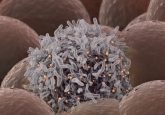Metabolic changes may be a sign of early development in pancreatic cancer

Research carried out at several institutions, including the Massachusetts Institute of Technology and Dana-Farber Cancer Institute (both MA, USA), has uncovered a sign of early pancreatic cancer development.
The findings of the study, recently published in Nature Medicine, reveal that the elevation of circulating branched-chain amino acids may be an early indication of human pancreatic adenocarcinoma development.
Although the findings are not significant enough for the development of a new test for early detection of this disease, this study will help researchers gain a better understanding of how pancreatic cancer affects the rest of the body and how it can trigger cachexia.
“Most people with pancreatic ductal adenocarcinoma are diagnosed after the disease has reached an advanced stage, and many die within a year of diagnosis,” stated Brian Wolpin of Dana-Farber and co-senior author of the new study with Matthew Vander Heiden. “Detecting the disease earlier in its development may improve our ability to treat it successfully. In this study, we asked whether pancreatic ductal adenocarcinoma produces metabolic changes – changes in the way the body uses energy and nutrients – that can be detected before the disease is diagnosed.”
The study involved analysis of 1500 blood samples collected from individuals participating in large health-tracking studies years prior to this investigation. The samples were screened for more than 100 metabolites and the results of those participants who had developed pancreatic cancer were compared with those who had not. The findings revealed that higher levels of branched-chain amino acids were present in individuals who developed pancreatic cancer compared with those who did not develop the disease.
The results led Wolpin’s group to hypothesize that the increase in branched-chain amino acids was due to the presence of an early pancreatic tumor. This theory was subsequently confirmed by research led by Vander Heiden at the Koch Institute for Integrative Cancer Research at the Massachusetts Institute of Technology. These experiments demonstrated that mice with newly formed pancreatic tumors had an elevated blood level of these amino acids.
This increase was demonstrated to be due to the breakdown of muscle tissue causing the branched-chain amino acids to be released into the blood stream, which is similar to what occurs in patients with cancer cachexia. “What was surprising about our results was that it appears the breakdown of muscle protein begins much earlier in the disease process than previously appreciated,” explained Vander Heiden.
The authors believe that the results of this research are an important lead to scientists studying how pancreatic tumors interact with normal tissues. “This work has the potential to spur progress in detecting pancreatic tumors earlier and identifying new treatment strategies for those with the disease,” remarked Vander Heiden.
Sources: Mayers J R, Wu C, Clish C B et al. Elevation of circulating branched-chain amino acids is an early event in human pancreatic adenocarcinoma development. Nature Medicine doi: 10.1038/nm.3686 (2014) [Epub ahead of print]; Dana-Farber Cancer Institute press release



